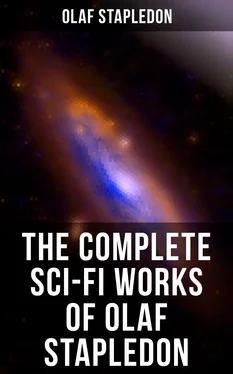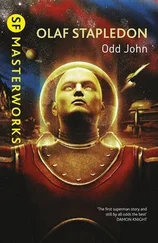Olaf Stapledon - The Complete Sci-Fi Works of Olaf Stapledon
Здесь есть возможность читать онлайн «Olaf Stapledon - The Complete Sci-Fi Works of Olaf Stapledon» — ознакомительный отрывок электронной книги совершенно бесплатно, а после прочтения отрывка купить полную версию. В некоторых случаях можно слушать аудио, скачать через торрент в формате fb2 и присутствует краткое содержание. Жанр: unrecognised, на английском языке. Описание произведения, (предисловие) а так же отзывы посетителей доступны на портале библиотеки ЛибКат.
- Название:The Complete Sci-Fi Works of Olaf Stapledon
- Автор:
- Жанр:
- Год:неизвестен
- ISBN:нет данных
- Рейтинг книги:5 / 5. Голосов: 1
-
Избранное:Добавить в избранное
- Отзывы:
-
Ваша оценка:
- 100
- 1
- 2
- 3
- 4
- 5
The Complete Sci-Fi Works of Olaf Stapledon: краткое содержание, описание и аннотация
Предлагаем к чтению аннотацию, описание, краткое содержание или предисловие (зависит от того, что написал сам автор книги «The Complete Sci-Fi Works of Olaf Stapledon»). Если вы не нашли необходимую информацию о книге — напишите в комментариях, мы постараемся отыскать её.
Novels:
Last and First Men: A Story of the Near and Far Future
Last Men in London
Odd John: A Story Between Jest and Earnest
Star Maker
Darkness and the Light
Sirius: A Fantasy of Love and Discord
Death into Life
Short Stories:
The Flames (1947)
The Seed and the Flower
The Road to the Aide Post
A Modern Magician
East is West
A World of Sounds
Arms Out of Hand
The Complete Sci-Fi Works of Olaf Stapledon — читать онлайн ознакомительный отрывок
Ниже представлен текст книги, разбитый по страницам. Система сохранения места последней прочитанной страницы, позволяет с удобством читать онлайн бесплатно книгу «The Complete Sci-Fi Works of Olaf Stapledon», без необходимости каждый раз заново искать на чём Вы остановились. Поставьте закладку, и сможете в любой момент перейти на страницу, на которой закончили чтение.
Интервал:
Закладка:
To all the preoccupations then, and to all the ways of life, and all the ideals, of the early races, the explorer must react with that delight which triumphs over contempt and disgust. Of course there is very much in this sphere which he can whole-heartedly enjoy, since much in primitive life is the unspoiled behaviour of the animal, and much also improves upon the animal. But at a very early stage primitive man begins to torture his own nature into grotesque forms, inadvertently or by intent; much as, inadvertently, he tortures his domestic animals, and by intent he turns his pets into freaks and caricatures. This violation of his own nature increases as he gains power, and reaches its height in primitive industrial communities such as your own. In such phases the individual body and spirit become more and more distorted, impoverished, noisome. The early explorer, studying these phases, was hard put to it to prevent his overwhelming indignation and nausea from spoiling his study. He had, of course, to observe it all as though it were happening to himself, since he observed it through the suffering minds of its victims. And so he was almost in the position of a sick doctor, whose spirit must triumph by delighting in the study of his own disease.
Grotesque sentiments such as the lust of business success or economic power of any kind, and indeed every purely self-regarding passion, from that of the social climber to that of the salvation-seeking ascetic, are experienced by the explorer with something of that shame which the child, emerging into adolescence, may feel toward the still-clinging fascination of his outgrown toys, or with such disgust as the youth may feel when he wakes from some unworthy sexual infatuation. But this shame and disgust the explorer must learn to transcend as the surgeon the disgust of blood. Even the passions of hate and gratuitous cruelty, so widespread in your own and all other primitive species, he must learn to accept with sympathy, in spite of his spontaneous revulsion from them and his well-justified moral condemnation of them.
One great difference between ourselves and most primitive minds is that, while in us all motives are fully conscious, fully open to introspection, in them scarcely any of their more complex motives are ever brought fully to light. Thus when the explorer is following some train of action in a primitive mind, he very often observes an immense discrepancy between the mind’s own view of its motives and the real motives which he himself sees to be in fact the source of the activity. To experience all the daily and hourly perversities of a lifelong complex, to experience them not merely through clinical observation but in the most intimate manner, puts him to an extremely severe strain. At every turn his own mind is wrenched by the conflict in the mind that he is observing. And in him the conflict is wholly conscious and shattering. Not a few of our early observers became infected by the disorder which they had been studying, so that when they returned to their native world they could no longer behave with perfect sanity, and had to be destroyed.
To sum up, then, the earlier explorers were often desperately fatigued by the monotony of primitive existence and the sameness of primitive minds; and also they fell into disgust, an agony of disgust, with the crudity, insensitivity and folly of the primitive. From the one point of view it might be said that the Neptunian found himself condemned to sift the almost identical sand-grains of a desert, and even to record the minute distinctive features of each grain. From the other point of view, it was as though he had been banished from the adult world to the nursery or the jungle, and was actually imprisoned in the mind of babe or beast. For, once settled in the mind which he has chosen to study, the explorer is indeed a captive until study calls him elsewhere. Though he thinks his own thoughts, he perceives only what the other perceives, and is forced to endure every least sensation, thought, desire and emotion of the other, be it never so banal. Like one who feels within his own mind the beginnings of some mania or obsession which, though he recognizes that it is irrational or base, he cannot control, so the explorer is doomed to experience sympathetically all his subject’s thinking and desiring, even while he is nauseated by it. No wonder, then, that many early explorers were tortured by disgust or ennui.
Long before my time, most of these dangers and irks of exploration had been greatly reduced. One serious trouble, however, remains, and has even increased. A great army of workers was of course bred with special aptitudes for supra-temporal experience, and with special insight into the primitive types of mind. These new workers were given also a special enthusiasm and sympathy in respect of the past; and herein lay their danger. In my day every member of the race has something of this enthusiasm and sympathy; and we explorers have them in an extreme degree. So enthralling do we find the past, even in all its monotony and squalor, that many have succumbed to its spell, and lost all footing in the present world. Rapt in some great movement of history, or in some individual life-story, the explorer may lose, little by little, all memory of the future world of which he is a native, may in fact cease to be a future mind inspecting a past mind, and become instead a mere undertone or freakish propensity in the past mind itself, or in many past minds. In time even this may vanish, so that the explorer becomes identical with the explored. If this occurs, his own body, situated in the future and on Neptune, gradually disintegrates and dies.
Certain other troubles hamper even the most modern explorers, in spite of improved technique. The method by which we enter a past epoch is, as I have said, this process of shaping our minds to the basic pattern or ground-tone of the epoch to be studied. But when the explorer desires to enter a particular individual, he must try to assume the complex form or temperament which is distinctive of that individual; or else he must seize on one unique desire or thought, which he supposes to be peculiar to that individual at a certain date of his life. Now this process of mental infection or association does not necessarily work in his favour. Often, when he is trying to establish himself in some mind, or even when he has long been established, some chance association in his own thought-process may suddenly snatch him away from the object of his study and fling him into some other mind. Sometimes this other is a contemporary of the recent object of study; but often it is a mind in some different epoch or world. When this happens, not only is the study broken short, but also the explorer may be very seriously damaged. His brain, on Neptune, suffers such a fundamental and rapid readjustment that it is grievously jarred and strained, and may never recover. Even if he does not actually succumb, he may have to take a long holiday for recuperation. Fortunately, however, it is only the more extravagant dislocations that are really dangerous. Occasional jolts into minds of the same basic pattern as the original object of study are more exasperating than harmful.
Often when the explorer is resident in a particular individual he encounters through that individual’s perception another individual, who, he thinks, would repay immediate study. He has then to observe this other carefully through the perceptions of the first, so as to discover, if possible, some entry into his mind. This may be very difficult, since one primitive mind’s awareness of another is often so erroneous and biased that the perceptions which would make for true understanding of the other fail to occur. Moreover there is always the danger that, when the explorer attempts this ‘change of mounts’ he may fall between them, and be flung violently once more into his native location in time and space. Or again, he may at the critical moment be snatched by some chance association into some other epoch or world. Such accidents are of course very damaging, and may prove fatal.
Читать дальшеИнтервал:
Закладка:
Похожие книги на «The Complete Sci-Fi Works of Olaf Stapledon»
Представляем Вашему вниманию похожие книги на «The Complete Sci-Fi Works of Olaf Stapledon» списком для выбора. Мы отобрали схожую по названию и смыслу литературу в надежде предоставить читателям больше вариантов отыскать новые, интересные, ещё непрочитанные произведения.
Обсуждение, отзывы о книге «The Complete Sci-Fi Works of Olaf Stapledon» и просто собственные мнения читателей. Оставьте ваши комментарии, напишите, что Вы думаете о произведении, его смысле или главных героях. Укажите что конкретно понравилось, а что нет, и почему Вы так считаете.












